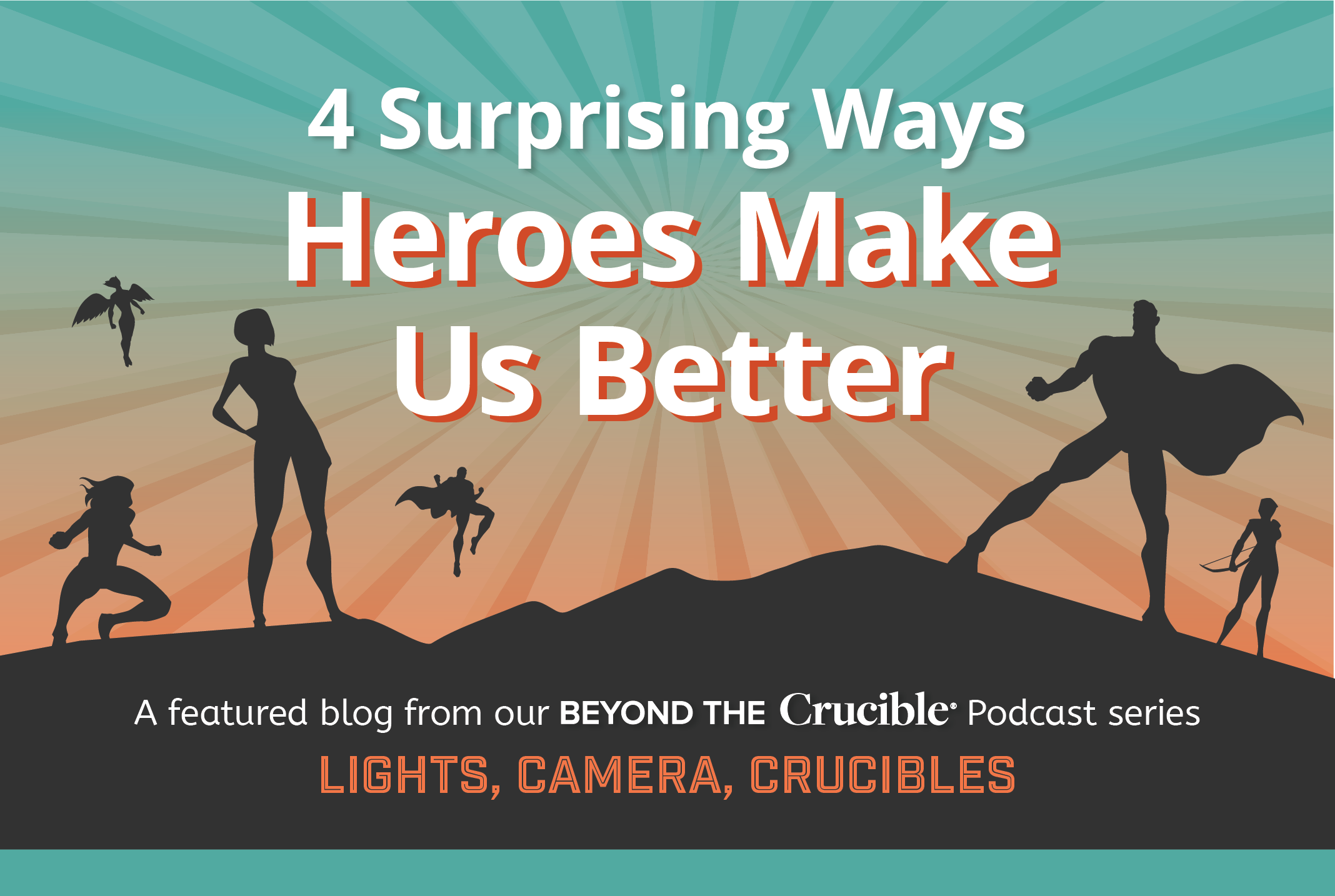

Gary Schneeberger
July 27, 2022
We are in the middle of a special summer podcast series at BEYOND THE CRUCIBLE we’re calling Lights, Cameras, Crucibles: What Our Favorite Movie Heroes Can Teach Us About Overcoming Setbacks and Failure. It’s been fun for me, both as cohost of the show and as a movie and hero fan since childhood, to dive into these insightful and practical discussions with Warwick for what will wind up being eight weeks in duration.
It occurs to me, though, that some friends of Crucible Leadership might be wondering why we’d spend so much time – two months – talking about fictional characters and the therefore fictional crucibles they’ve faced. With so many real-life men and women who’ve had all-too-real traumas and tragedies, isn’t it more important to focus on their stories?
Of course, there is great inspiration that comes from hearing the journeys of those who are navigating beyond their crucibles to live lives of significance. Those are the individuals, after all, whose stories we usually bring to listeners of the podcast. But as an article a few years ago in Psychology Today pointed out, there are surprising ways fictional heroes improve our lives. And in addition to unpacking the lessons these characters can teach us about moving beyond setbacks and failures, we also wanted to offer the truths discussed in that article.
So, as you continue diving into Lights, Camera, Crucibles, keep these points in mind from Psychology Today.
- Heroes produce an emotion called “elevation”
As the article by Scott T. Allison from April 6, 2014, notes, research suggests heroes and heroic action may evoke a unique emotional response that scientists have labeled “elevation.” The term and the concept undergirding it come from Thomas Jefferson, who used the phrase “moral elevation” to describe the euphoric feeling we get when reading great literature.
When we experience elevation, Allison wrote, we feel a mix of awe, reverence and admiration elicited by a morally beautiful act. Think about it: When Spider-Man rescues Mary Jane and defeats the Green Goblin, or Batman saves Gotham City from the Joker’s latest scheme to terrorize innocent civilians, or John McClane defeats the terrorists who’ve laid siege to Nakatomi Plaza on Christmas Eve in Die Hard, don’t you experience the climactic moment(s) with a sense of elevation, satisfaction and euphoria that the white hats have triumphed over the black hats?
- Heroes heal our psychic wounds
In ancient cultures, tribe members huddled around a communal fire at the end of each day, gathering together for warmth, yes, but also for protection. These acts of coming together also included another key activity—storytelling. And these initial stories were quite likely tales of heroes and heroic action, related in part to add to the sense of protection. Those listening felt safer knowing that forces of good were out there preserving their safety. That’s why so many modern hero stories exist in multiple iterations. Robin Hood has been a film staple since the silent-movie era because we are comforted when we imagine there’s someone dedicated to battling the forces of oppression to make life more livable, more enjoyable, more safe, for the marginalized and maligned.
- Heroes nourish our connections with other people
Storytelling is a community-building activity, Allison writes. The sense of connectivity it builds is critical to human emotional well-being. Hero stories create a strong sense of social identity, especially if the hero is a winning one – not just in outcome but in character and personality. The best, most resonant heroes reflect and reinforce the community’s most cherished values. Captain America’s character, Coach Norman Dale’s humble redemption in Hoosiers and Spider-Man’s sacrificial love for those closest to him give us something to aim for in our relationships.
- Heroes show us how to transform our lives, turning us into heroes ourselves.
Comparative mythologist Joseph Campbell said in 1988 that all of us undergo a hero-like journey throughout our lives. It’s only by having the courage and faith to risk change and growth in our own lives that we reach our own potential. It is nearly impossible to watch any of the movies we are discussing in our series and not feel the pull to a similar brand of heroism – not saving the world though superpowers, maybe, but dedicating our lives and gifts to serving others in ways similar to how a superhero, or action hero, or sports hero lives a life on purpose dedicated to serving others.
Psychologist Eric Erikson’s stages of human development, as discussed by Allison, posits that adults grow in significant ways as they gain age and experience, then in mid-life reach a stage of generativity, which Erikson defines as pouring something meaningful back into the society that has given them so much.
That sounds like living a life of significance, doesn’t it?
Reflection
- What movie hero – superhero, action hero or sports hero – is your favorite? In what ways does he or she inspire “elevation” in you as described above?
- What hero movies built more meaningful connections for you with others? What specifically about the hero(es) made that happen?
- Have you ever been so moved by a hero in a movie that it prompted you to act heroically yourself as explained above? How so? Why do you think it affected you that way?
Get The Whole Story
- To listen to our summer podcast series Lights, Camera, Crucibles – Click here


